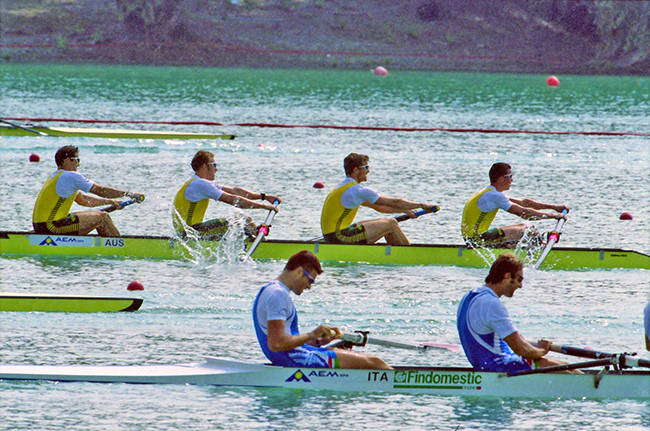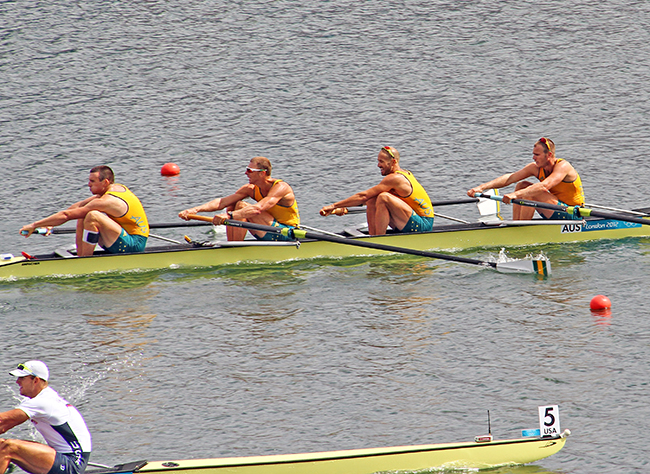James Chapman
Sydney Rowing Club (NSW)
James Chapman, a proud alumnus of Newington College in Sydney, achieved remarkable success in rowing, culminating in a victory at the Head of the River during the 100th AAGPS Regatta. In 2000, he earned his first selection for the Australian team, competing in the U23 men’s eight, which won a silver medal—a thrilling start to his international career.
His next major triumph came in 2003 when he claimed victory at the national championships in the men’s coxed four. This success led to his selection for the senior four at the World Championships, where the crew finished a commendable fourth in the A final.

2003 World Championships, Australian Men's Four with James in bow
In 2004, James continued his winning streak with another victory in the coxed four and helped NSW secure a King’s Cup—one of many titles to come. He was named the Olympic reserve, racing in the men’s pair at World Cup II, where the crew placed eleventh.
In 2005, he was selected for the four at the World Championships, finishing eleventh for the season. The following year, James made a significant move into the men’s eight for World Cup I, where they won a bronze medal. However, he returned to the four for World Cup II, placing eighth. At the World Championships, he was back in the eight, narrowly missing a medal with a fourth-place finish.
The year 2007 saw James spend the entire international season in the four, where the crew placed eighth at World Cup II and eleventh at World Cup III. Unfortunately, they finished twelfth at the World Championships that season, but James’s determination remained unwavering.
In 2008, he celebrated his second King’s Cup victory with NSW and earned selection for the Australian eight at the Beijing Olympics. In the lead-up to the Games, the crew finished fourth at World Cup II. At the Olympics, the Australian eight made it to the final but finished sixth, a disappointment for a team with such high hopes.
Following the Olympics, James took a year off to focus on his career in banking. He returned in 2010, winning another King’s Cup for NSW. In 2011, he secured yet another King’s Cup and returned to the Australian team for the international season. Competing in the coxed pair at World Cup III, he placed second, repeating this achievement at the World Championships later that year.
In 2012, James once again triumphed with a King’s Cup victory before being selected for the men’s four at the London Olympics. The lead-up to the Games was intense, with the four finishing second to Great Britain at World Cup II and winning at World Cup III in a thrilling rematch. At the London Games, the Australian four fought valiantly, claiming silver in a tightly contested race against Great Britain.

2012 Olympic Games Silver medalist
In 2013, James quickly returned to racing after the Olympics, winning the coxless four and the King’s Cup at the nationals, and taking first place in the four at World Cup I held in Sydney. This marked the end of his competitive season as he chose to stay home for the remainder of the year.
In 2014, he added to his legacy with his seventh King’s Cup victory and was selected to race overseas. At World Cup III, he finished sixth, and the season concluded at the World Championships, where he placed seventh after winning the B final.
%20650.jpg)
Celebrating his seventh King's Cup win holding the Cup
In 2015, James won another national title in the coxless four and was again picked for the Australian eight. He reached the semifinals at Henley and finished fifth at World Cup III. Unfortunately, the crew ended the season ninth, failing to qualify for the Rio Games.
In 2016, James secured his last national title in the coxed four and was selected for the Australian men’s eight to compete at the Final Olympic Qualification Regatta. The crew needed to finish in the top two to secure a spot at the Games but fell short, coming in fourth. This race marked the end of James’s illustrious career, as he retired shortly after the regatta. His journey was one of remarkable achievements and resilience, leaving behind a legacy as a legend in NSW rowing, having contributed to seven King’s Cup victories.
Some rowing highlights
1997 AAGPS Head of the River – First
2000 World Rowing U23 Championship Men’s Eight – Second
2003 National Championship Open Men’s Coxed Four – First
2003 World Rowing Championship Men’s Four – Fourth
2004 National Championship Open Men’s Coxed Four – First
2004 National Championship Interstate Men’s Eight – First
2004 World Rowing Cup II Men’s Pair – Eleventh
2005 World Rowing Championship Men’s Four – Eleventh
2006 World Rowing Cup I Men’s Eight – Third
2006 World Rowing Cup II Men’s Four – Eighth
2006 World Rowing Championship Men’s Eight – Fourth
2007 World Rowing Cup II Men’s Four – Eighth
2007 World Rowing Cup III Men’s Four – Eleventh
2007 World Rowing Championship Men’s Four – Twelfth
2008 National Championship Interstate Men’s Eight – First
2008 World Rowing Cup II Men’s Eight – Fourth
2008 Beijing Olympic Games Men’s Eight – Sixth
2010 National Championship Interstate Men’s Eight – First
2011 National Championship Interstate Men’s Eight – First
2011 World Rowing Cup III Men’s Coxed Pair – Second
2011 World Rowing Championship Men’s Coxed Pair – Second
2012 National Championship Interstate Men’s Eight – First
2012 World Rowing Cup II Men’s Four – Second
2012 World Rowing Cup III Men’s Four – First
2012 London Olympic Games Men’s Four – Second
2013 National Championship Open Men’s Coxless Four – First
2013 National Championship Interstate Men’s Eight – First
2013 World Rowing Cup I Men’s Four – First
2014 National Championship Interstate Men’s Eight – First
2014 World Rowing Cup III Men’s Eight – Sixth
2014 World Rowing Championship Men’s Eight – Seventh
2015 National Championship Open Men’s Coxless Four – First
2015 World Rowing Cup III Men’s Eight – Fifth
2015 World Rowing Championship Men’s Eight – Ninth
2016 National Championship Men’s Coxed Four – First
2016 FISA European and Final Olympic Qualification Regatta Men’s Eight– Fourth
Jack Hargreaves
December 2024

